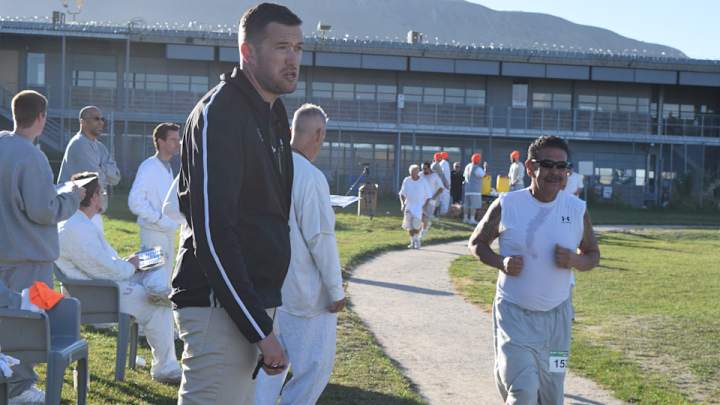Free to Run: A college coach helps stage a prison yard marathon

Inmate Brian Taylor finished running 110 laps in the Oquirrh prison facility yard on Tuesday afternoon in three hours, 30 minutes and 53 seconds. It was not a punishment. It was a victory in the Wasatch Facility Marathon in Draper, Utah.
It was not the first marathon held within the confines of the prison, but it was the first in which Weber State assistant cross-country coach Isaac Wood volunteered to help out Taylor and other inmate runners. Wood was there thanks to inmate Jason Penney, who before the summer had written letters to club and college coaches across Utah seeking a mentor or coach for himself and his fellow inmates who wanted to run a marathon.
Wood doesn’t receive too much mail at his office. What looked like just another letter from a parent looking to get their kid recruited turned out to be something completely different.
It read: “My name is Jason. I hope you will allow me to tell you a little bit about myself. I am a runner. Walking through the gates of Utah State Prison in Draper was not my proudest moment, but neither was it my most discouraging.”
The letter went on to detail how depression and self-pity took its toll on his body after he arrived at the prison in 2001 and he added 60 pounds to his 5'10" frame.
Penney is serving a 15-year sentence for sexual abuse, aggravated sexual abuse and sodomy of a child. The sentences vary in length: one to 15 years, five to life and 15 years to life. In Utah, the state’s Board of Pardons and Parole determine how long he will serve, and Penney is scheduled for a hearing before the board in 2021.
In the meantime, he has been using running as self-medication and as a stabilizing influence for his depression. He has lost more than 85 pounds. He was not much of a runner before he discovered the sport behind bars and started reading books and magazines to guide his own training. As Penney wrote, “the marathon is a challenge that some of us have tackled, it is something that none of us can say we have really figured out.”
Wood was struck by Penney’s words. “It was really a moving letter and it spoke to me,” Wood says. “You don’t get too many letters from a guy in prison who legitimately wants you to just coach them. I’m a young coach and I just love to help people improve in their running. Any chance that I get to coach, I’ll take. I saw this as a neat opportunity to give back.”
• WERTHEIM: Who Killed Lorenzen Wright?
Wood has helped coach high school athletes, and he served as an assistant for the Florida State women’s cross-country team under renowned coach Karen Harvey, who has since moved on from the Seminoles program. But Wood had never coached anyone for a marathon and he had never coached anyone behind bars.
He did, however, have experience with people who had been incarcerated or knew someone who had been incarcerated while teaching and assisting on a Mormon mission trip from 2008 to 2010 in Stockton, Calif. Wood knew he could help—and being within the confines of a prison actually made him feel safer than he’d sometimes felt on the streets doing missionary work.
Weber State head coach Paul Pilkington, a former U.S. national champion in the marathon, approved of Wood’s work with the inmates. Wood also had short conversations on the venture with BYU cross-country head coach and two-time U.S. Olympic marathoner Ed Eyestone. Wood decided to call the prison back about the letter. He was the only coach to do so.
“I called Jason and at first he didn’t even believe that I had received the letter but I told him that I wanted to do this,” Wood says. “We worked out a few details and then he asked me ‘What do you expect about prison?’ I told him I’d watched Prison Break and I hoped it wasn’t anything like that.”
• KAHLER: The Rules of Donut Club
In the first week of June, Wood made his initial trip to Draper to meet his new athletes. Beforehand, he took to the Internet and did some research on Penney—not because he wanted to know about the crime that he had committed, but because he wanted to know what Penney looked like and whether he could connect with him on a personal level.
“A lot of the guys are pretty real about their situations,” Wood says. “They know why they’re in there. They know they’ve screwed up big time, but they didn’t really talk to me about what they had done. I tried not to make what they did in the past a part of what we were doing. I wanted running to be the positive force for good in their life and move on from what they had done.”
On his first visit, Wood gave the inmates a questionnaire to fill out. One of the inmates read aloud “Do you have any previous running experience?” before replying, “Back when I was running, I was running from the cops.” Another spoke up and said “Obviously, unsuccessfully.”
Wood laughed with the rest of the inmates and was able to memorize all of their names on the first day. Then it was time to put their legs to the test.
Most of the inmates were wearing tank tops and dirty old white athletic shoes that had already logged dozens of miles. Some of the inmates opted to run 800 meters and struggled to break four minutes. Others tackled the mile and found themselves clocking times in the 5:40 to six-minute range—not bad for a group of runners who sometimes can only work out in a yard that takes 22 laps to complete a mile.
Wood went on to make about eight trips to prison. He would hand down workouts to the runners to do on their own before supervising tempo runs and interval training on his visits. The supervised runs mostly took place at 6:30 p.m., and even then the temperature occasionally hit 95 degrees.
“I once made the mistake of telling the guys, ‘If you’re feeling pretty bad, just make sure to let me know, slow down or stop. I’m not trying to kill anyone out here.’ That gave me a few looks, but I caught my mistake and we brushed it off,” Wood recalled.

Race day arrived, and 26 inmates turned out to run. Six would tackle the full 26.2 miles, while the others settled for the 10K or half-marathon option. Recreation Lt. Malan White and recreation officer Joseph Curcio were on site to supervise the race, while 13 other inmates, some the cellmates of the racers, also volunteered for the event.
There were bananas, granola bars, water, Gatorade and an aid station. The event had much of what one would encounter at any major road race. Still it was vastly different than the extravaganza that will be staged at this weekend’s New York City Marathon, where millions of fans will gather along the course to cheer on loved ones and where runners cross over bridges and speed around street corners instead of turning left for the entire race.
The inmates took off. The volunteers yelled splits alongside Wood while one held a clipboard with an Excel sheet that was drawn up by Penney to cross off a runner’s laps.
“One benefit to having it be 110 laps was that they would see us all the time,” Wood said. “The only tough part for me was to come up with new things to say each time around.”
Runners dropped off as they completed their respective race distance. Guadalupe Cuevas, 41, who did not train under Wood and was only cleared to run this weekend after a fight in the prison gym left him forbidden from joining sooner, won the 10K in 47:49. Cuevas was convicted of first-degree felony attempted rape and sexual abuse of a child and burglar in 2006.
Michael Callahan, 31, won the half-marathon in 1:49:05 before 76-year-old Ron Warren crossed the finish line less than hour later in 2:47:48. Callahan is jail for the aggravated sexual assault of a woman nearly seven years ago.
In the marathon, Taylor was on pace for a 3:15 finish but cramped up in the final miles. Still, he trudged along to victory in a pair of athletic shoes that he had stitched together, and broke the finish line tape— another new touch in this year’s race.
Wood estimates that if you give him a better training environment, put him on a fast course and switch him out of his old shoes and into a pair of trainers, Taylor could shave off another 20 minutes off his winning time and easily qualify for the Boston Marathon in his age group.
Taylor has told Wood that running Boston or any marathon with his daughter is a goal. The soonest he could get that chance is after he is scheduled for a parole hearing in Jan. 2018 as he is serves a sentence for the rape and sodomy of a child.
“I spent my 20s drinking and doing drugs. I spent my 30s realizing why I shouldn’t do it. I’m hoping to spend my 40s proving that I am a good man and I would never do that stuff ever again,” he once told Wood.
Wood watched as the fifth of the six marathoners crossed the finish line in approximately four hours and thirty minutes. David Potter had only been training with Wood’s group for the last month and a half. With three rods in his legs and one leg being longer than the other, he completed his first marathon.
“I’ve never seen someone so happy before,” Wood said.
“This is the best high I’ve ever had,” Potter exclaimed.
He later turned to Wood and said, “My dad is going to be so proud of me. I have to call him.”
“To be able to help a guy and be able to smile like what he did after the finish line – that’s real,” Wood said. “That’s what made this whole thing worth it.”
Tuesday was very much like many weekends for Wood. He woke up at 6 a.m. and went to see his athletes run.
(Note: Before joining Sports Illustrated, Chavez previously wrote for Flotrack.org from June 2012 to June 2014. Wood was also employed as an associate producer and analyst for five months from Jan. 2014 to May 2014.)
